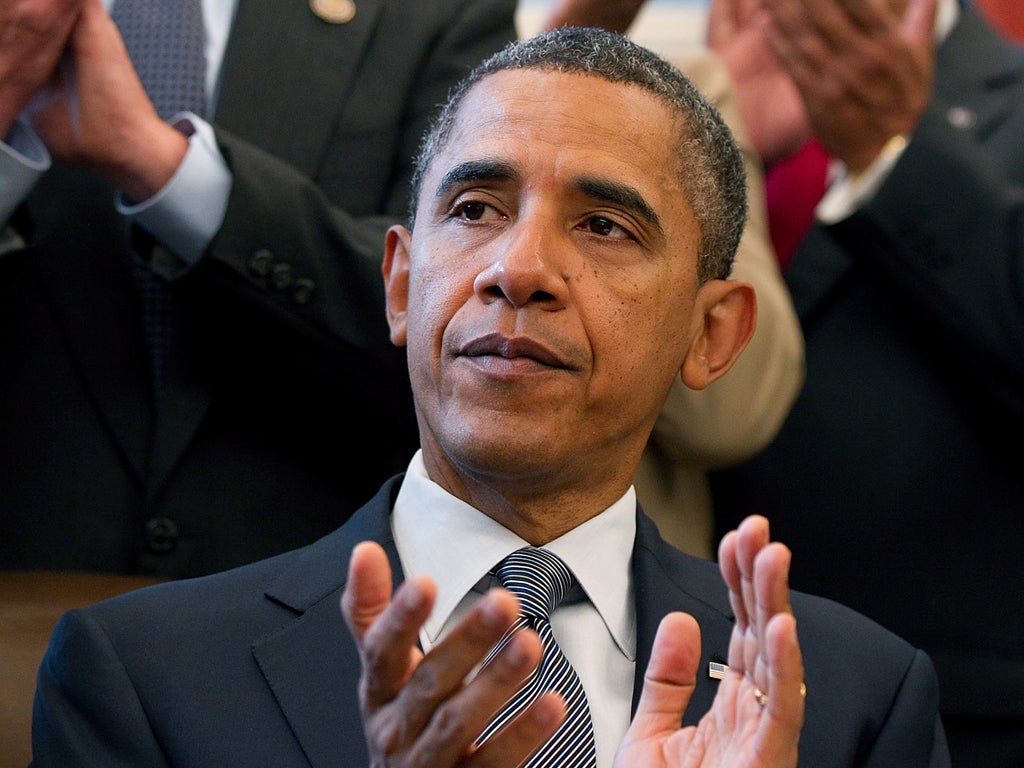How Obama won the war - but lost the battle on Capitol Hill
Policy of 'leading from behind' is vindicated, but no one is applauding the President for it

President Barack Obama spent a part of yesterday signing three important new international trade treaties into law.
Nowhere on his schedule was there mention of a "mission accomplished" ceremony to celebrate the demise of a certain Libyan tyrant.
Relief might be the most important sentiment in the West Wing. When a former top-level foreign policy adviser who had only very recently left the administration spoke with a reporter in July, he was clear about the Libya mission: Mr Obama had "made a mistake" in getting America involved. The rebels were bogged down. It was starting to look like a ghastly mess.
Whether Mr Obama himself ever lost faith doesn't matter now. Nor need he worry any more about perhaps the most damaging criticism that seemed in the summer to stick to him, voiced anonymously by a still-serving foreign affairs adviser – that his strategy in Libya amounted to "leading from behind".
The description did – and still does – seem apt. The US deployed plenty of firepower and other logistical back-up but also deliberately sought to take a back seat to Nato and to the British and the French. "Without putting a single US service member on the ground," President Obama said in his brief Rose Garden press conference on Thursday, "we achieved our objectives, and our Nato mission will soon come to an end."
In Libya, Mr Obama travelled about as far away from the "shock and awe" approach on foreign policy practised by his predecessor, George W Bush, as could be imagined. Infuriated Republicans, you would think, should be ready to denounce Mr Obama for failing properly to deploy the unequalled power that is America's and in next year's election to paint him as a dwarf on the world stage. Yet there are problems with this.
First, although foreign policy remains filled with trouble spots, Mr Obama has a record of results that voters will understand. A daring Navy Seals mission, ordered personally by the President, dispatched Enemy No 1, Osama bin Laden. Last month the American-born al-Qa'ida agitator and leader, Anwar al-Awlaki, was picked out and killed in Yemen by a missile from an American drone. And now Libya.
It is telling, perhaps, that the Republicans struggle to forge their own consensus world view. On Libya, candidates for the nomination, notably Michele Bachmann, lambasted the President all summer for taking part in the mission at all. Others, like Senator Marco Rubio of Florida, fancied by some as someone's running mate next year, argue he should have hit Gaddafi much harder and much faster.
Ronald Reagan called Gaddafi the "mad dog of the Middle East". Yet on the day he was killed, almost no one in the field of Republicans hoping to deny Mr Obama a second term felt able to give him credit for the dictator's death. "Yes, yes, absolutely," Mitt Romney finally managed to gasp after being asked by reporters all day if the administration deserved applause, before vanishing behind a door. His top adviser, Eric Fehrnstrom, briefed differently. The murder of Gaddafi "brings to an end a brutal chapter in Libya's history, but does not validate the President's approach to Libya," he suggested.
John McCain, the Arizona senator, is not running for the White House this time and could afford to be more forthcoming. "It is a great day. I think the administration deserves great credit," he told CNN. "The world is a better place." He added later: "The fact is this is another success for the Obama administration."
The Libya mission also worked because of a consensus that emerged among the world powers. Russia and China acquiesced in the UN Security Council. The Arab League asked for Nato intervention. On Syria no such consensus exists: the democracy bus Mr Obama would love to dispatch to Damascus still has some notable empty seats.
Join our commenting forum
Join thought-provoking conversations, follow other Independent readers and see their replies
Comments